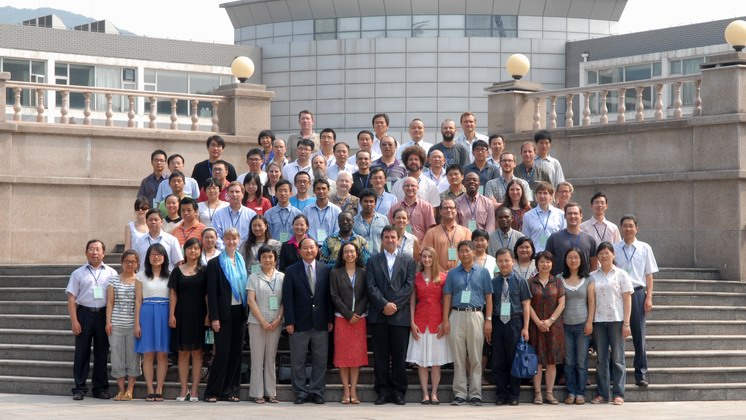

Co-sponsored and organized by the Biodiversity Committee, Chinese Academy of Sciences (BC-CAS) and the Center for Tropical Forest Science (CTFS), Smithsonian Institution, USA, the International Symposium on Climate Change and Forest Biodiversity Conservation was held in Beijing from July 27 to 28, 2011.
In recent years, with worsening global climate change, the conservation and research of forest biodiversity has become a hot research area. About 100 scientists from more than 16 countries and areas including China, USA, Australia, Brazil, Thailand, and Philippine made comprehensive exchange on the themes of mechanisms of forest biodiversity composition, dynamics of forests and their responses to climate change. Experts from CTFS, Harvard University, Michigan State University, University of Oregon, and Institute of Botany, Shenyang Institute of Applied Ecology, South China Botanical Garden of CAS, Zhejiang University, and Taiwan Tunghai University presented more than 30 talks on the following topics: 1) Community spatial patterns and species coexistence mechanisms, 2) Plant recruitment: seed and seedling stages, 3) Community phylogenetics, and 4) Forest dynamics under disturbances.
CTFS is one of the world leading institutions in the area of mechanisms of species composition of forest biodiversity. Its well-established ecologists conduct research in biodiversity, and have published many papers in high-profile scientific journals such as Nature, Science, and PNAS. Their work has helped us understand the mechanisms of ecosystem change and maintenance, especially those of species coexistence.
Established by BC-CAS, the Chinese Forest Biodiversity Monitoring Network (CForBio) was greatly supported by Chinese Academy of Sciences, Ministry of Science and Technology of China, National Natural Science Foundation of China, and CTFS. With involvement of several CAS institutes and universities, the Network has established ten large-scale forest monitoring plots, spanning temperate, subtropical and tropical zones. These plots make it possible for Chinese scientists to conduct deeper investigations on the mechanisms of community biodiversity maintenance and other related ecological processes, to understand the nature of biodiversity maintenance in China, and to better protect the biodiversity. In just few years, CForBio has made very productive progress. More than 40 papers have been published in the top-tier scientific journals, and attracted attention of international colleagues.
During this symposium, scientists reported their latest first-hand research progress. The symposium greatly promoted academic exchange between scientists from China and overseas, will have profound influence on ecology research and protection of biodiversity in China.
(reported by BC-CAS)


Co-sponsored and organized by the Biodiversity Committee, Chinese Academy of Sciences (BC-CAS) and the Center for Tropical Forest Science (CTFS), Smithsonian Institution, USA, the International Symposium on Climate Change and Forest Biodiversity Conservation was held in Beijing from July 27 to 28, 2011.
In recent years, with worsening global climate change, the conservation and research of forest biodiversity has become a hot research area. About 100 scientists from more than 16 countries and areas including China, USA, Australia, Brazil, Thailand, and Philippine made comprehensive exchange on the themes of mechanisms of forest biodiversity composition, dynamics of forests and their responses to climate change. Experts from CTFS, Harvard University, Michigan State University, University of Oregon, and Institute of Botany, Shenyang Institute of Applied Ecology, South China Botanical Garden of CAS, Zhejiang University, and Taiwan Tunghai University presented more than 30 talks on the following topics: 1) Community spatial patterns and species coexistence mechanisms, 2) Plant recruitment: seed and seedling stages, 3) Community phylogenetics, and 4) Forest dynamics under disturbances.
CTFS is one of the world leading institutions in the area of mechanisms of species composition of forest biodiversity. Its well-established ecologists conduct research in biodiversity, and have published many papers in high-profile scientific journals such as Nature, Science, and PNAS. Their work has helped us understand the mechanisms of ecosystem change and maintenance, especially those of species coexistence.
Established by BC-CAS, the Chinese Forest Biodiversity Monitoring Network (CForBio) was greatly supported by Chinese Academy of Sciences, Ministry of Science and Technology of China, National Natural Science Foundation of China, and CTFS. With involvement of several CAS institutes and universities, the Network has established ten large-scale forest monitoring plots, spanning temperate, subtropical and tropical zones. These plots make it possible for Chinese scientists to conduct deeper investigations on the mechanisms of community biodiversity maintenance and other related ecological processes, to understand the nature of biodiversity maintenance in China, and to better protect the biodiversity. In just few years, CForBio has made very productive progress. More than 40 papers have been published in the top-tier scientific journals, and attracted attention of international colleagues.
During this symposium, scientists reported their latest first-hand research progress. The symposium greatly promoted academic exchange between scientists from China and overseas, will have profound influence on ecology research and protection of biodiversity in China.
(reported by BC-CAS)
